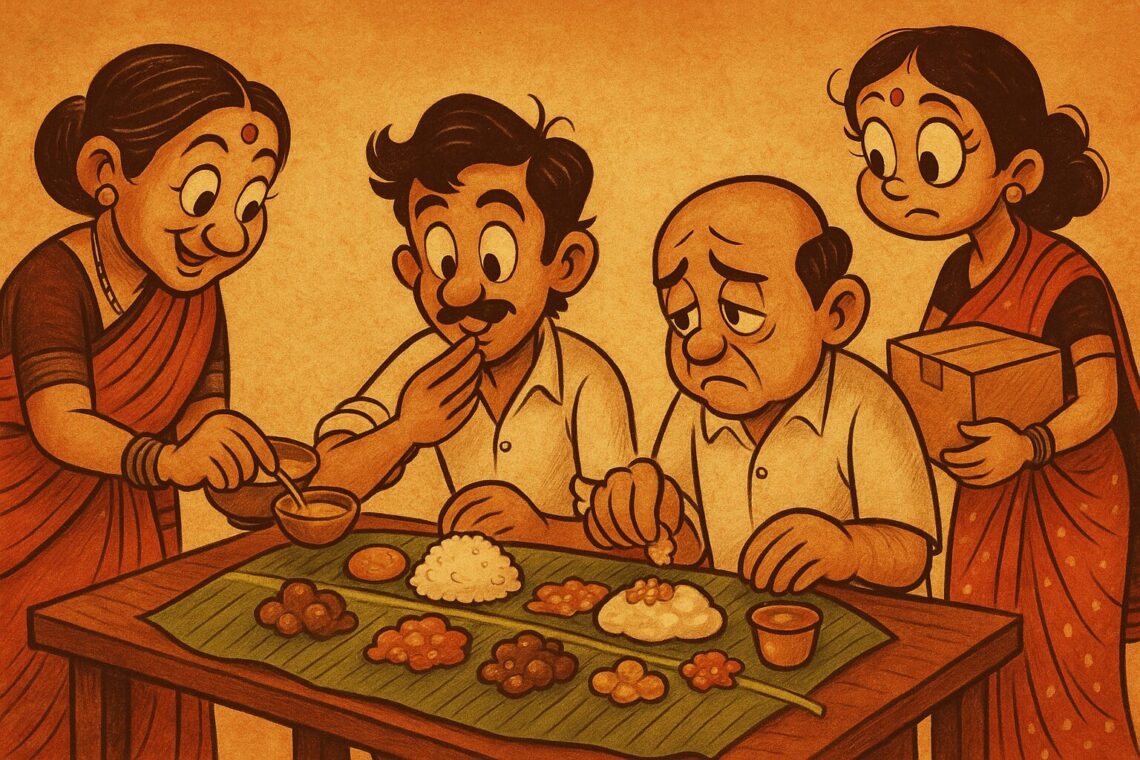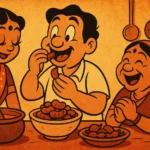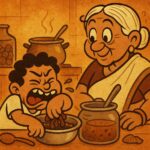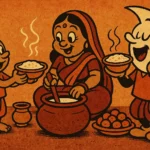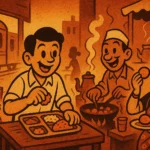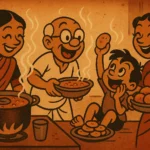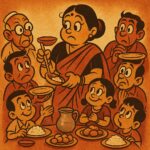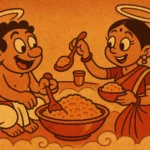The last time I ate on a banana leaf in my childhood home, no one said it was the last. But I remember everything—the mound of rice, the tamarind tang of rasam, the way the ghee melted slowly down the slope of the leaf, and my mother, half-seated, half-hovering, ladling more sambhar onto my plate while I pretended I wasn’t leaving for college the next day. That meal said everything our words couldn’t.
In Indian culture, food rarely exists without occasion. But there’s something quietly profound about meals that mark an ending. Not a celebration, not a festival—just that bittersweet in-between where food fills the silence, where the act of serving becomes a gentle way of saying goodbye.
Banana Leaves and Endings
In the South, banana leaf meals are often celebratory—but they also play a central role in mourning. After a funeral, a sapad is served—simple, vegetarian, deliberately grounding. It’s not about indulgence. It’s about closure. You eat not because you’re hungry, but because something must be done with the hands when the heart doesn’t know what to do.
I’ve sat at such meals where the conversation was hushed, but the flavors were intact—paruppu, koottu, a spoon of payasam at the end. Grief, it turns out, doesn’t need silence. It needs rice and someone to pour ghee over it with care.
The Farewell Plate
Not all endings are tragic. Some are just… heavy. Like the day you move out for a new job. Or when your siblings get married. Or when a school year ends and your group of friends has their “last lunch” in the canteen. The food at these moments suddenly feels charged, even if it’s just idli-sambar or a shared vada pav. You remember it not because it was special, but because it was the last. The unremarkable becomes a bookmark.
When I left for the U.S., my mother didn’t make anything fancy. She made the food I grew up on: bhindi fry, varan-bhaat, dahi. It tasted normal. Familiar. Unremarkable—until I tried replicating it a week later in an Austin apartment with a cracked nonstick pan and imported cumin that smelled like doubt. That’s when I understood what farewell food really is: it’s memory in edible form. Not meant to impress. Just to anchor.
Grief Has a Flavor
In Kerala, the thirteenth-day feast after a death includes kanji—rice porridge—served with pickle, papad, and sometimes a dry vegetable. It’s bland, but it carries meaning. In Tamil Nadu, the srardham meal follows specific rules: no garlic, no onion, a sense of restraint in every bite. In Bengal, khichuri often features during both pujas and mourning—because food is never about just one feeling. It carries joy and sadness in the same spoon.
These aren’t meals you remember for their spice or variety. You remember the quiet around them. The way no one asked for seconds. The way someone always served, even if they didn’t eat. In moments when everything else falters—prayer, conversation, even memory—food continues. A small gesture of continuity in the face of change.
Cooking As a Goodbye
Sometimes, making the food is the real farewell. When my grandmother passed away, my aunt insisted on making her signature payasam for the family. She stood for hours, stirring, measuring everything by memory. When it was done, she served it in the same steel tumblers my grandmother used. No words. Just ladles and long-held recipes. It was grief, sweetened with jaggery.
In that moment, cooking wasn’t performance. It was processing. Something to do with the hands while the heart caught up.
Not All Goodbyes Are Obvious
Sometimes, you don’t know it’s the last time. You don’t know it’s the last Sunday lunch at your parents’ house before they sell it. Or the last shared filter kaapi before a friend moves to another city. Or the last time you eat a certain dish before your palate changes or your body can’t handle spice anymore.
But the food remembers. You’ll bite into something years later—mango pickle on a rainy day, mysore pak in a paper box—and suddenly, you’re back at that meal. That moment. That goodbye you didn’t know was happening.
What Stays Behind
Today, in Austin, I still eat on banana leaves during festivals. But once in a while—on days that feel like turning points—I make a meal on one just for myself. Simple food. Rice, dal, maybe a fried vazhakkai. I eat in silence. Not because I’m sad. But because I want to hold something before it passes.
Because sometimes, the best way to say goodbye isn’t with words. It’s with a spoonful of rasam poured over rice on a warm banana leaf, eaten slowly, while the world quietly shifts around you.
Born in Mumbai, now stir-frying feelings in Texas. Writes about food, memory, and the messy magic in between — mostly to stay hungry, sometimes just to stay sane.

